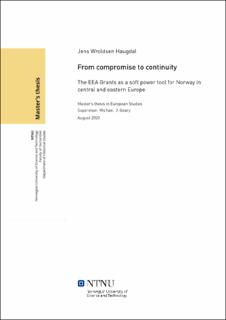| dc.contributor.advisor | Geary, Michael J. | |
| dc.contributor.author | Haugdal, Jens Wroldsen | |
| dc.date.accessioned | 2021-09-13T16:05:34Z | |
| dc.date.available | 2021-09-13T16:05:34Z | |
| dc.date.issued | 2020 | |
| dc.identifier | no.ntnu:inspera:59783522:37234757 | |
| dc.identifier.uri | https://hdl.handle.net/11250/2775623 | |
| dc.description.abstract | Sammendrag.
Denne oppgaven undersøker hvordan Norge får innflytelse på sentral og østeuropeiske land gjennom EØS-midlene. Målet med oppgaven er å undersøke hvordan det innenrikspolitiske klimaet rundt Norges forhold til EU har påvirket utformingen av EØS-midlene. Oppgaven er basert på begrepet soft power formulert av Joseph. S. Nye. Problemstillingen er derfor ‘’Bruker Norge EØS-midlene som et soft power verktøy i sentral og øst Europa?’’. Oppgaven er sett i sammenheng med begrepsforklaring av soft power. Metoden for gjennomføring er en kvalitativ dokumentanalyse kombinert med en Case-studie av Ungarn som mottaker av EØS midler. Oppgaven redegjør også for utviklingen av konflikten mellom EØS-landene og Ungarn om kontrollen over utdelingen av EØS-midlene. Den tar for seg de brede utviklingstrekkene fra Norges folkeavstemninger om EU-medlemskap i 1972 og 1994 til signeringen av EØS avtalen. Oppgaven gir et overordnet inntrykk av nøkkelhendelser som påvirket utviklingen mot EØS-midlene som de er i dag. Den etablerer et skille mellom de overordnede EØS-midlene og det særnorske bidraget. Oppgaven redegjør også for måter som Norge kan bruke EØS-midlene for å skaffe seg innflytelse i mottakerlandene. Funnene tyder på at den innenrikspolitiske situasjonen har i stor grad påvirket hvordan EØS-midlene ble utformet. Norge har også hatt suksess med å øke det norske avtrykket på EØS-midlene de senere årene. Case studien fant en sammenheng mellom konflikten med Ungarn, og norsk påvirkning på EØS-midlene. Samtidig må dette sees i kontekst hvor Ungarn og senere Polen har utviklet illiberale tendenser og konflikten sentrerer rundt den finansielle kontrollen på EØS-midlene. Det er derfor ikke et grunnlag for å konkludere med at konflikten med Ungarn skyldes norsk innblanding i den innenrikspolitiske situasjonen i Ungarn. Oppgaven bekrefter problemstillingen, og konkluderer med at Norge bruker EØS-midlene som et soft power verktøy i sentral og øst Europa. | |
| dc.description.abstract | Abstract
The thesis investigates how Norway is using the EEA-Grants to gain influence in central and eastern European countries. The reasoning for the paper is to investigate how the domestic political situation in Norway towards the EU has affected the design of the EEA-Grants. The thesis is based on the concept of soft power developed by Joseph. S. Nye. The research question was ‘’ Does the EEA Grants serve as a soft power tool for Norway in central and eastern Europe?’’. The thesis is centred around the concept of soft power influence. The methods selected to solve the task is a qualitative document analysis in combination with a Case study of Hungary as a recipient of EEA-Grants. The thesis details the development of the dispute between the EEA-countries and Hungary over management of the EEA-Grants. It accounts for the broad developments from the Norwegian referendums on EU membership in 1972 and 1994 to the signing of the EEA Agreement. The thesis establishes a separation between the overall EEA-Grants and the Norwegian funded Norway-Grants. It accounts for the ways that Norway may wield the EEA-Grants to increase its influence. The findings suggest that the domestic political situation has impacted the design of the EEA-Grants. Norway has enjoyed success in increasing the Norwegian signature on the EEA-Grants in the recent years. The case-study uncovered a connection between the conflict with Hungary and the Norwegian influence on the EEA-Grants. The discovery must be seen in context with the illiberal tendencies displayed by both Hungary and later Poland, and with the conflict surrounding the financial control over the EEA-Grants. It is therefore not possible to conclude that the conflict with Hungary is a consequence of the Norwegian interference in the political situation in Hungary. The thesis is affirmative to the research question and concludes that Norway is using the EEA-Grants as a soft power tool in central and eastern Europe. | |
| dc.language | | |
| dc.publisher | NTNU | |
| dc.title | From compromise to Continuity - The EEA Grants as a soft power tool for Norway in central and eastern Europe | |
| dc.type | Master thesis | |
